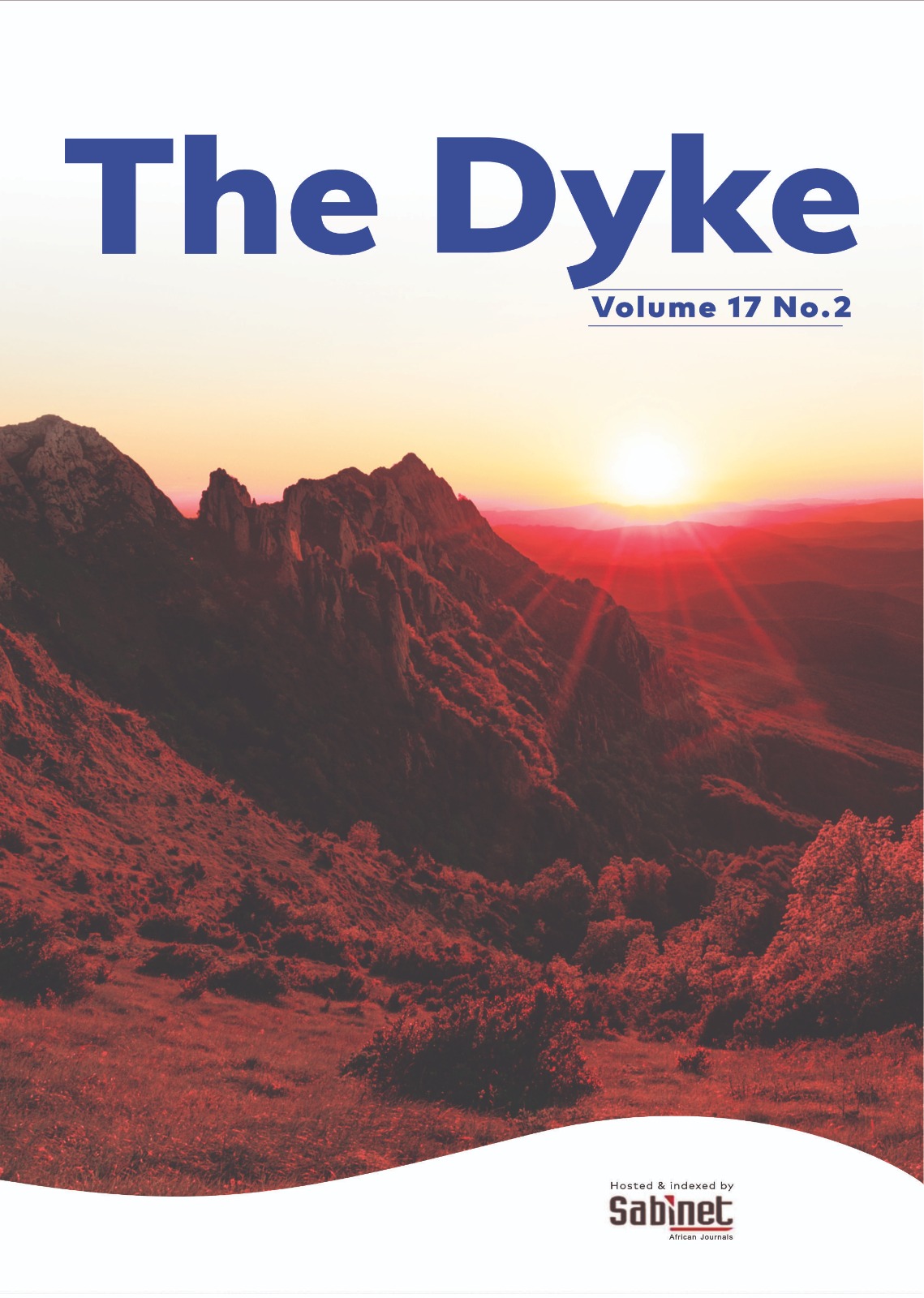Disaster risk management: Taking a leaf from the priestly legacy and the African worldview.
DOI:
https://doi.org/10.64754/thedyke.v17i2.261Keywords:
Priestly writers, problem of evil, Ecological disasters, African worldview, sinAbstract
Each moment a devastating disaster strikes, the age-old problem of evil inevitably comes to mind. God’s omnipotence and omniscience are once again called into question. The devastating 2019 Cyclone Idai, Covid-19, and Cyclone Freddy, temperatures hitting unprecedented record highs across the world in 2023 for example, remain mind-boggling disasters that call for explanation and by default efforts to avoid or minimise the repeat of such disasters. Faced with the remarkable, unprecedented, and terrifying reality of climate change, repeated warnings of global boiling have been issued and calls to adopt United Nations SMART-based plans of action are becoming louder as well. As the world pins its hopes on SMART action plans to unplug the tragic consequences of climate change, the paper bemoans what one views as a deliberate sidelining of religion in all these efforts. Through a comparative analysis, the paper interrogates the Priestly legacy and the African worldview in an attempt to salvage lessons from them on how ancients were tackling disaster risk reduction. Both emphasize a vital starting point to disaster reduction, namely: the concept of collective responsibility. Humans, according to Priestly teachings, are in control of their destiny and every act of social exploitation, and moral corruption, pollutes the sanctuary until such time God is driven out entirely and human society is devoured by its own viciousness and death-dealing. Similarly, from an African worldview, man is created as a moral agent in relation to God his Creator, and fellow men. The underlying argument thus in this paper is that not belittling the advances that have so far been made in the sciences to avert disasters, to offer a comprehensive response to disaster risks, there is a need to tap lessons from the religious traditions of the ancients.
References
Awolalu, J. O. 1976. Sin and its removal in African traditional religion, Journal of the American Academy of Religion, 44(2), 275-287.
Bongmba, E. K. (ed). 2012. The Wiley-Blackwell Companion to African Religions. Willey-Blackwell and Sons, Inc. Publications.
Brueggemann, W. 2002. Reverberations of faith: A handbook of the Old Testament themes, Westminster: John Knox.
Calkins, J. 2015. Moving Forward after Sendai: How countries want to use science, evidence, and technology for disaster risk reduction, Plos Currents: Disasters, viewed 11 November 2023, from https://currents.plos.org/disasters/article/moving-forwrd-after-sendai-how-countries-want-to-use-science-evidenceand-technology-for-disaster-risk-reduction/.
Creegan, N. H. 2013. Animal suffering, and the problem of evil. New York: Oxford University Press.
Crenshaw, J. L. 2005. Defending God: Biblical responses to the problem of evil. New York: Oxford University.
Fager, J. A. 1993. Land tenure, and the political jubilee: uncovering the Hebrew Ethics through the sociology of knowledge. England: Sheffield Press.
Habel, N. C. 1977. Literary criticism of the Old Testament. Philadelphia: Fortress Press.
Hundley, M. B. 2011. Keeping heaven on earth: Safeguarding the divine presence in the Priestly Source, Tubingen: Mohr Siebeck.
Kimuhu, J. M. 2008. Leviticus: The Priestly laws and prohibitions from the perspective of ancient near East and Africa. New York: Peter Lang Publishers.
Klawans, J. 2005. Purity and riverine Judaism, Oxford: Oxford University Press.
Latvus, K. 1998. God, anger, and ideology: The Anger of God in Joshua and judges in relation to Deuteronomy and priestly writings. England: Sheffield Academy Press.
Milgrom, J. 2000. Leviticus 17-22, Yale University Press.
Ngwa, K. N. 2005. The Hermeneutics of Happy Ending in Job 42: 7-17, Berlin: Walter de Gryter.
Perdue, L. G., Morgan, R. and Sommer, B. D. 2009. Biblical Theology: Introducing the Conversation Abingdon Press.
Saxena, A. 2023. Advanced Technology in Disaster Management, viewed 16 January 2024, from https://www.linkedin.com/pulse/advanced-technologydisaster-management-ambuj-saxena.
Shoko, T. 2007. Karanga indigenous religion in Zimbabwe: Health and Well-Being. Ashgate.
Southgate C. 2008. The groaning of creation: God, evolution, and the problem of evil. Westminster: John Knox Press.
Throntveit M. A. 1992. Ezra-Nehemiah, John Knox, Louisville, KY.
Ukpokolo, I. E. (ed). 2017. Themes, issues, and problems in African philosophy. Macmillan: Palgrave.
UNDRR 2015. Implementing the Sendai Framework, viewed 23 November 2023, from https://www.undrr.org/implementing-sendai-framework/whatsendai-framework.
Von Rad G., 1962. Old Testament Theology, New York: Harper Collins Publishers.

Downloads
Published
How to Cite
Issue
Section
License
All articles in The Dyke are published under the Creative Commons Attribution 4.0 International License (CC BY 4.0).
Under this licence:
- Others may copy, redistribute, remix, transform, and build upon the work for any purpose, even commercially.
- Appropriate credit must be given to the original author(s) and source (The Dyke), along with a link to the license.
- Any changes made must be indicated.
Full licence details: https://creativecommons.org/licenses/by/4.0/
Archiving and Preservation
The Dyke supports long-term preservation of scholarly work through partnerships with digital repositories and indexing services, including Sabinet African Journals. Authors are also encouraged to deposit a copy of their published article in institutional or subject-specific repositories.




